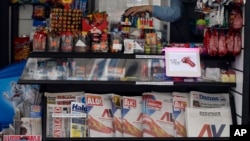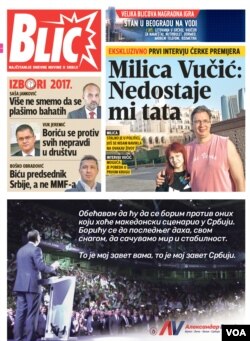In an unprecedented move on the Serbian presidential campaign trail, the ruling Serbian Progressive Party (SNS) on Thursday purchased the front pages on almost every daily newspaper to advertise its candidate, current Prime Minister Aleksandar Vucic.
Vucic's party bought seven out of nine daily editions, making newspaper stands look like uniformly plastered billboards. Only the independent Danas (Today) and the Informer, a staunchly pro-Vucic outlet, opted against printing the candidate's red-and-blue AV logo-emblazoned poster without any news stories.
Blic, Belgrade's splashy middle-market tabloid, did have one news article on the cover: an interview with Vucic's 14-year-old daughter. The headline: "I Miss My Dad." Serbian election laws forbid using children in political and marketing campaigns.
Vucic remains the leading candidate heading into Sunday's election, with forecasts indicating that he holds more than 50 percent of the vote in a field of 11 candidates. Second-place candidate Ljubisa Preletacevic Beli, who holds an estimated 10 percent of the vote, responded to Thursday's news cycle via social media by posting a photo montage of blank newspaper covers.
Beli, which means "the white one," is the moniker of communications student Luka Maksimovic, 25, who moonlights as a comedic entertainer and initially launched his campaign as a joke.
Vucic, a former information minister under former President Slobodan Milosevic, was elected prime minister in 2014 on a reformist platform that vowed to lead the Balkan nation toward democracy.
Thursday's propaganda blitz stoked fears about the overall fairness of Sunday's vote.
"Today's print media have revealed the real state of democracy under Vucic's rule," former Serbian President Boris Tadic said in a public statement. "We are looking at the North Korean scenario for Serbia if he wins the election."
"This is the last warning for the citizens of Serbia to come out and vote in order to defend freedom and democracy," Tadic added, slamming Serbian news outlets as slanted and fearful of challenging Vucic.
SNS party chief Vladimir Orlic called it a legitimate, advertisement-driven marketing strategy, rejecting criticism of Vucic and claiming that Europe backs the incumbent.
"When it comes to the Macedonian, Ukrainian or Romanian scenario, and calling out for protests in the streets, we could only hear that from the opposition during this campaign," Orlic told VOA's Serbian service. "We care about peace and stability and we don't need street fights and smashed heads."
Opposition marginalized
The mainstream media under Vucic's control have largely demonized most of the 10 opposition challengers, without giving them the opportunity to respond.
In the social media sphere, commentators called Thursday the end of Serbian news ethics, and some netizens reminisced about the front pages that accompanied the death of former Yugoslavian President Josip Broz Tito in 1980. On that day, newspapers featured hagiographic portraits and appreciations of the late totalitarian to the exclusion of other news.
In Serbia, the office of the prime minister carries far more real power than that of the president, as in Germany and Austria and unlike the U.S., Russia or France, where the president dominates.
Vucic has not explained why he wants to move from the office of institutional authority to the one holding mostly ceremonial powers. Some analysts have said he made the decision out of fear that his ally and Serbia's incumbent president, Tomislav Nikolic, would struggle to win a second term and lose the post to the opposition.
This report was produced in collaboration with VOA's Serbian service. Some information came from AP.





